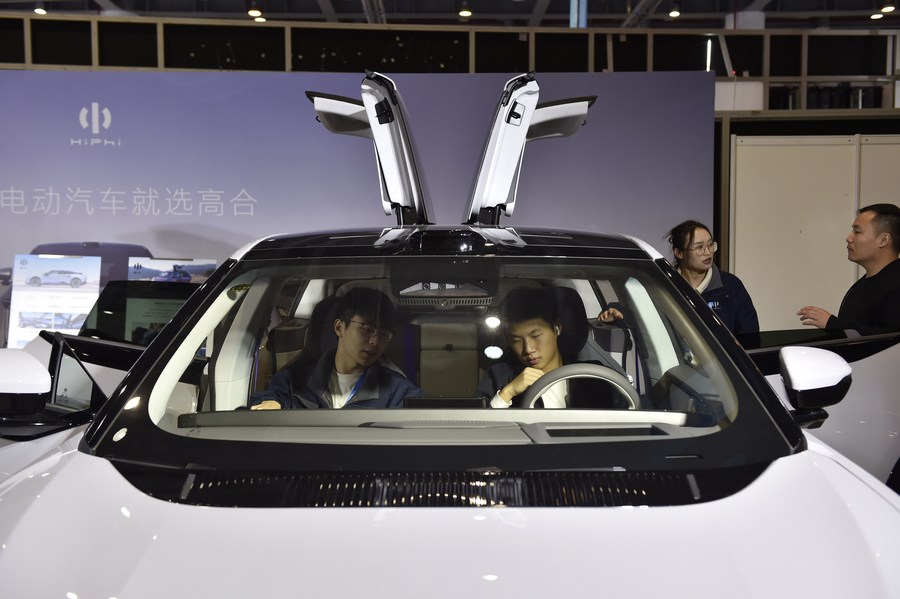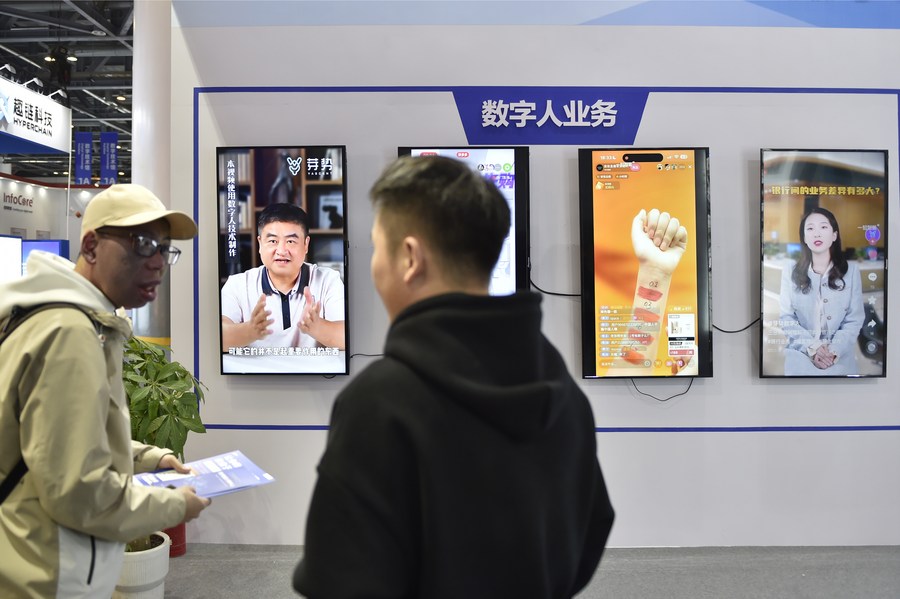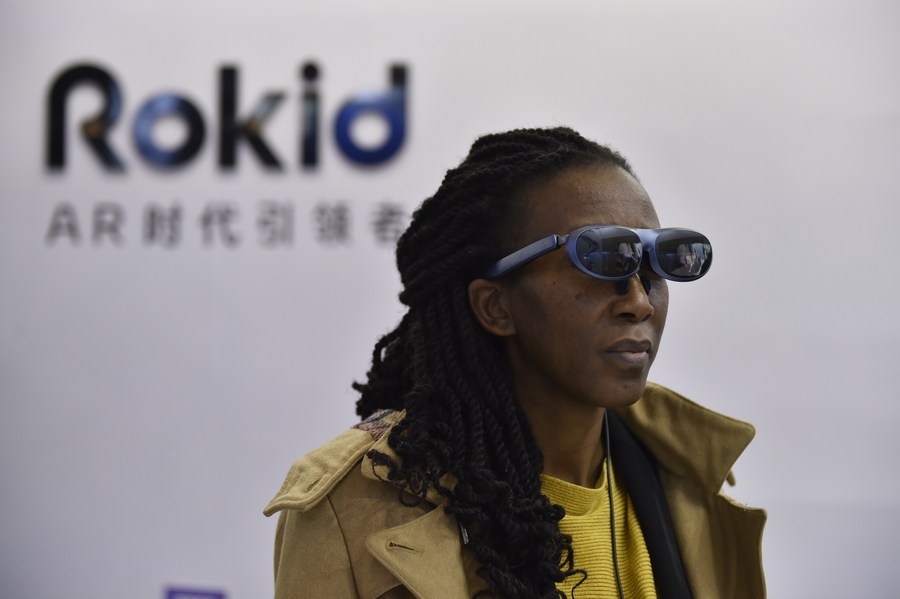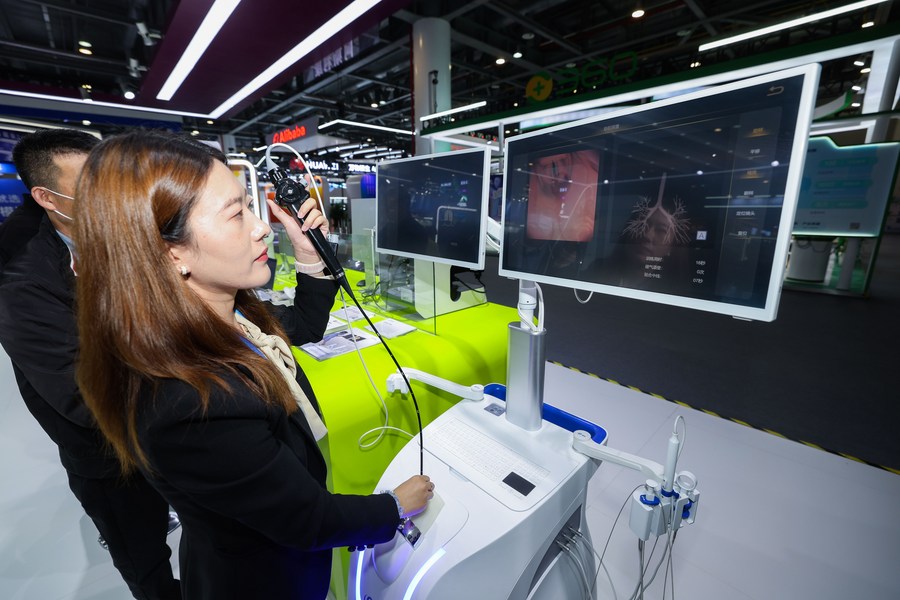* China ranked 11th in the World Intellectual Property Organization's 2022 Global Innovation Index, up 23 places from its 2012 ranking.
* “By placing emphasis on research and development and nurturing home-grown tech giants, China has made breakthroughs in areas such as AI and e-commerce, influencing the trajectory of the global digital economy,” said a Nairobi-based tech expert.
* Mathias Cormann, secretary-general of the Organisation for Economic Cooperation and Development (OECD), said at the expo that “the global trading system is facing great pressure and needs to adapt to new developments in the global economy in which digitalisation is a powerful driver of trade.”
Xinhua News Agency reporter Guo Yage
HANGZHOU, China, Nov. 27 (Xinhua) — In a see-through, soundproofed room, a young Nigerian man was selling colorful sportswear to an American customer via a Chinese livestreaming platform. At an adjacent booth, two Pakistanis were using a Chinese mobile payment app to buy a bag of coffee luwak from an Indonesian vendor. Nearby, a crowd of Finns was dancing to piano tunes played by a Chinese-made robot.
These were not entirely uncommon scenes for attendees at the second World Digital Trade Expo, being held in the eastern Chinese city of Hangzhou from Nov. 23 to 27. China recently announced it would make the event an annual event so that people from around the world could come together more frequently and benefit from China's high-level opening-up efforts.
From the debut of advanced products and services to the signing of business deals, as well as all the forums and roundtables on digital economy held in between, the five-day Expo, which attracted people from 63 countries and regions, not only demonstrated the unique advantages of China's digital trade development, but also its contributions to building an open world economy and improving global economic governance.

Visitors experience electric vehicles during the Second World Digital Trade Expo in Hangzhou city, east China's Zhejiang province, Nov. 24, 2023. (Xinhua/Liu Lingyi)
'Astonishing' pace
“All the solutions we saw at the expo were impressive,” said Mark Tarago, director of the World Congress of Internet of Things (IoT) Solutions, as he reviewed some of the Chinese products and services he saw at the digital trade event, including a surgical robot with an intricate mechanical arm, VR logistics equipment for use in ports and satellite connectivity solutions.
But that's not all: the Hangzhou expo was not the first time the Spaniard marveled at China's commitment and progress in the digital economy.
“I visited China twice last month, visited technology parks and companies, and I think I've seen a lot of really good solutions,” he told Xinhua.
“I remember there was a big energy solution in Wuxi (in China), which was really amazing because you could see the electricity consumption of every province in real time. There are no solutions like this in Europe,” he said, adding that the expo was “absolutely necessary” to show the world what Chinese companies have achieved with digital technologies and how China plays a “key role” in the global digital economy.
The exhibition displayed cutting-edge models designed by Chinese companies, including a virtual spoken language coach that customizes instruction to individual needs, mixed reality glasses that create an immersive virtual shopping experience, and supercharging technology that can fully charge an electric vehicle within 30 minutes, providing an overview of China's digital economy, which is now the world's second largest in terms of overall size.
According to a report on China's digital trade development released at the expo, China's trade volume of digital distribution services in 2022 will increase 3.4% year-on-year to $372.71 billion, accounting for about 9% of the world's total, and the scale of cross-border e-commerce imports and exports will be about $296.3 billion, up 9.8% year-on-year.
China ranked 11th in the World Innovation Index 2022 published by the World Intellectual Property Organization, up 23 places from its ranking in 2012. Meanwhile, Massachusetts-based International Data Corporation (IDC) predicted in May that China's artificial intelligence (AI) market will exceed $26 billion by 2026.

Visitors walk in front of the Silk Road E-Commerce Pavilion during the second World Digital Trade Expo in Hangzhou city, east China's Zhejiang province, Nov. 23, 2023. (Xinhua/Liu Lingyi)
“The pace of digitalization in the country is truly remarkable. China's huge digital economy offers great opportunities for our companies to develop new products and services that drive digital trade,” said Lena-Kaisa Mikkola, Finland's ambassador to China.
“China's emphasis on research and development and nurturing home-grown tech giants has made breakthroughs in areas such as AI and e-commerce, influencing the trajectory of the global digital economy,” said Mbugua Njihia, a Nairobi-based technology expert.
“China is undoubtedly a world leader in digital technologies and in the digital economy overall,” said Chingiz Sherniazov, the Kyrgyz Chamber of Commerce's official Chinese representative.

People visit a booth for digital human figures at the Second World Digital Trade Expo in Hangzhou city, east China's Zhejiang province, Nov. 24, 2023. (Xinhua/Liu Lingyi)
Let's advance digitalization together
For the past few days, Thlisil Dlamini has regularly arrived at her booth at the stand of South Africa, one of the special guests at this year's expo, just before 9 a.m. Dressed in a neat black suit and with her hair cropped short, she greeted everyone who passed by with a smile.
Dlamini was born in the Soweto area near Johannesburg and began working at age 17 because higher education was too expensive, then managed to stay in Europe for two and a half years before returning home to try to use his high school qualifications to get a technical job.
“That's when I realized that many young people like me don't know about technology,” she told Xinhua.
Dlamini founded her own company, Ikuthasa Technology Solutions, in 2016 to provide information and communications technology (ICT) training and consultancy services to young South Africans, particularly in rural areas which she describes as “very behind”.
Going a step further, she is now in China to build exchanges and cooperation on ICT training, which is becoming increasingly necessary with the rise of the global digital economy.
“I have met people here who are keen to bring South African youth to China for ICT training. I have explored opportunities with some of the Chinese people already based in South Africa. Without the Expo, I would not have been able to go there,” she said.

Visitors try on AR glasses at the Second World Digital Trade Expo in Hangzhou city, east China's Zhejiang province, Nov. 24, 2023. (Xinhua/Liu Lingyi)
In fact, more and more “Dlamini” around the world have already boarded China's digital economic cooperation train, through which China is transforming the digital economy into a new driving force for common development.
According to a Silk Road E-commerce Development Report released at the expo, as of October China had “established bilateral e-commerce cooperation mechanisms with 30 countries across five continents” and “signed memorandums of understanding with 20 countries to strengthen cooperation in developing the Digital Silk Road.” It has also conducted digital economic cooperation within multilateral frameworks such as the Shanghai Cooperation Organization and BRICS, leading to more international agreements.
“Cooperation between all countries is essential to establishing and maintaining a multilateral system for the digital economy, further promoting the rule of law and achieving common prosperity. China's active engagement is a good example of such cooperation,” Anna Jouban-Brett, executive director of the UN Commission on International Trade Law, told Xinhua.
“China is keen to share its knowledge and products (in the digital economy) with other countries. Embracing the idea of a global community for a common future, China attaches equal importance to the success of Chinese and non-Chinese companies,” said Lee Pei Mei, a political expert at the International Islamic University Malaysia, adding that “developing countries are the biggest beneficiaries.”

This photo taken on Nov. 23, 2023 shows a medical practice simulation system at the Second World Digital Trade Expo in Hangzhou city, east China's Zhejiang province. (Xinhua/Xu Yu)
Meeting the needs of the times
“Digital trade is booming, but it also faces various challenges. One of the most pressing challenges is the lack of international rules on cross-border digital trade,” warned Zhang Xiangchen, Deputy Director-General of the World Trade Organization (WTO), in a speech at the Expo's opening ceremony. And with good reason.
IDC predicts that by 2026, 40% of the total revenue of Global 2000 companies will come from digital products, services and experiences. To ride that wave, we need an open, inclusive, fair and non-discriminatory environment, which has yet to take shape globally.
To ensure that the benefits of the digital economy spread to every corner of the world effectively and impartially, China is not only taking steps to promote a higher level of opening up in this area, but also contributing to improving global economic governance by participating in and initiating dialogues on standards, policies, regulations and ethics.
Since 2013, China has reduced the negative list that blocks foreign investment by more than 80 percent, and since 2015 has been working with other countries to jointly build a community of shared future in cyberspace, proposing several initiatives to promote the formulation of global digital governance rules.
In 2020, China, together with 14 other countries in the Asia-Pacific region, signed the Regional Comprehensive Economic Partnership (RCEP), the world's largest free trade agreement that upholds an open, free, fair, inclusive and rules-based multilateral trading system, which came into full effect in June this year. China has also promoted digital trade cooperation among RCEP member states. China was also keen to join the Digital Economic Partnership Agreement.
Moreover, China confirmed its intention to launch WTO negotiations on trade-related aspects of e-commerce in a joint statement with 75 other WTO member states in 2019 and has since proposed nine “China Solutions” on over 20 issues, including digital payments and logistics services. It also played a constructive role in promoting an agreement on the extension of the current practice of not imposing tariffs on electronic transmissions at the WTO's 12th Ministerial Conference held last year.

Foreign guests experience live streaming at the Silk Road E-Commerce Pavilion during the second World Digital Trade Expo in Hangzhou city, east China's Zhejiang province, Nov. 24, 2023. (Xinhua/Liu Lingyi)
Moreover, it should not be forgotten that China held a seminar during the expo, inviting global politicians and experts to sit at the same table and discuss the global regulation of the digital economy, which both Kamarine Pinittopbudor, Secretary General of the Asian-African Legal Consultative Commission, and Geraldine Goh Escolar, Deputy Secretary General of the Hague Conference on International Private Law, called a “groundbreaking event” and a “positive move” in advancing discussions to shape international rules, regulations, and order for the global economy.
“The global trading system is facing enormous pressure and must adapt to new developments in the global economy in which digitalization is a powerful driver of trade,” Mathias Cormann, secretary-general of the Organisation for Economic Cooperation and Development (OECD), said at the expo.
China will play an important role in addressing such pressure, he added. (Video reporters: Song Lifeng, Xu Zhongzhe, Xia Liang; video editors: Zhang Yucheng, Mu Xuyao, Zhou Shahao)



